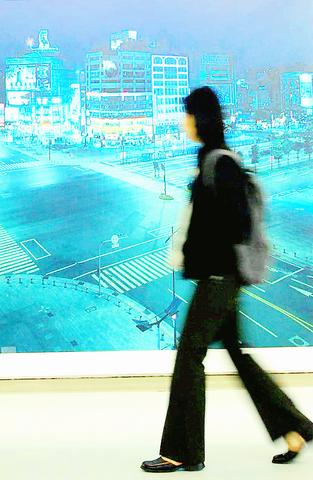If the Taipei Biennial ever had a political goal, it was the amicable diplomacy of art.
But this year the brand of cross-strait bickering usually reserved for government officials has intruded on an exhibition that since 1998 has put the Taipei Fine Arts Museum on contemporary art's international map.
The 2002 Taipei Biennial, curated by Bartomeu Mari of Spain and Taiwan's Jason Wang (

PHOTO: SEAN CHAO, TAIPEI TIMES
The opening, held last night, attracted critics and curators from Lyons to Beijing, who had all come to see an exhibition conscientiously designed around artifice, spectacle and the spaces in which people live and act. Its theme is "Great Theater of the World."
The behind-the-scenes intrigue comes from the dark world of politics.
The drama began in March at Brazil's Sao Paulo Biennial, where the Chinese government put pressure on organizers to remove the word "Taiwan" from Taiwan's national pavilion, making it the only one of around 70 national pavilions not designated by a country. The pavilion's entrance merely read "Taipei Fine Arts Museum."
In response, Taiwan's representative artist, Chang Chien-chi (
Chang, a photographer devoted to social issues that are more or less borderless, is not part of this year's biennial, but Wang Gong-hsin (
Word of Wang's presence broke yesterday in a Chinese-language newspaper, which raised the question of his involvement in the Sao Paulo incident.
Museum officials, Wang and the art world in general, denounced the allegation as ridiculous.
Wang, in fact, called the article "amusing," but refused to enter into any debate, saying that as an artist it was more suitable to remain in the province of art.
Taiwanese sources also defended Wang.
The co-curator of the 2000 Taipei Biennial, Manray Hsu (許文瑞), who was also in Sao Paulo, said of the censorship incident, "It had more to do with the [Chinese] government. They were the source of the pressure."
Museum director Huang Tsai-lang (
Even the beleaguered Chang said, "There's no proof of Wang's involvement."
Though the buzz of controversy was still building at last night's opening ceremony, but visiting artists were not impressed.
"The reason we have these exhibitions is to move away from these stupid boundaries and limitations," said Edwin Zwakman, an artist from the Netherlands.
"This is not a propaganda game for governments," he said.
For more information on the art work in the 2002 Biennial, see tomorrow's features page.

The High Prosecutors’ Office yesterday withdrew an appeal against the acquittal of a former bank manager 22 years after his death, marking Taiwan’s first instance of prosecutors rendering posthumous justice to a wrongfully convicted defendant. Chu Ching-en (諸慶恩) — formerly a manager at the Taipei branch of BNP Paribas — was in 1999 accused by Weng Mao-chung (翁茂鍾), then-president of Chia Her Industrial Co, of forging a request for a fixed deposit of US$10 million by I-Hwa Industrial Co, a subsidiary of Chia Her, which was used as collateral. Chu was ruled not guilty in the first trial, but was found guilty

DEADLOCK: As the commission is unable to forum a quorum to review license renewal applications, the channel operators are not at fault and can air past their license date The National Communications Commission (NCC) yesterday said that the Public Television Service (PTS) and 36 other television and radio broadcasters could continue airing, despite the commission’s inability to meet a quorum to review their license renewal applications. The licenses of PTS and the other channels are set to expire between this month and June. The National Communications Commission Organization Act (國家通訊傳播委員會組織法) stipulates that the commission must meet the mandated quorum of four to hold a valid meeting. The seven-member commission currently has only three commissioners. “We have informed the channel operators of the progress we have made in reviewing their license renewal applications, and

‘DENIAL DEFENSE’: The US would increase its military presence with uncrewed ships, and submarines, while boosting defense in the Indo-Pacific, a Pete Hegseth memo said The US is reorienting its military strategy to focus primarily on deterring a potential Chinese invasion of Taiwan, a memo signed by US Secretary of Defense Pete Hegseth showed. The memo also called on Taiwan to increase its defense spending. The document, known as the “Interim National Defense Strategic Guidance,” was distributed this month and detailed the national defense plans of US President Donald Trump’s administration, an article in the Washington Post said on Saturday. It outlines how the US can prepare for a potential war with China and defend itself from threats in the “near abroad,” including Greenland and the Panama

Taiwan People’s Party (TPP) Chairman Huang Kuo-chang (黃國昌) yesterday appealed to the authorities to release former Taipei mayor Ko Wen-je (柯文哲) from pretrial detention amid conflicting reports about his health. The TPP at a news conference on Thursday said that Ko should be released to a hospital for treatment, adding that he has blood in his urine and had spells of pain and nausea followed by vomiting over the past three months. Hsieh Yen-yau (謝炎堯), a retired professor of internal medicine and Ko’s former teacher, said that Ko’s symptoms aligned with gallstones, kidney inflammation and potentially dangerous heart conditions. Ko, charged with